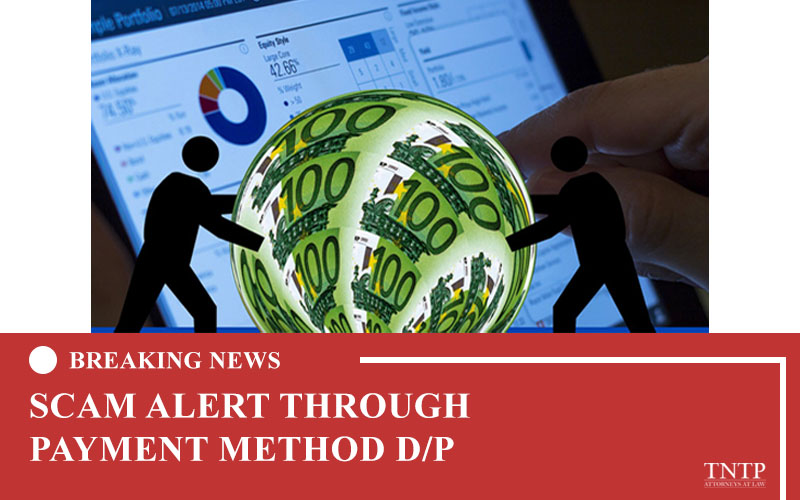In the past few years, a series of fraud acts by foreign entities and organizations have occurred to
Vietnamese enterprises when trading in all markets, from Africa, India to developed countries such as the US, the Netherlands, and the most recently thing is that Vietnamese enterprises were defrauded 100 containers of cashew nuts in Italy has seriously affected the economic recovery process after Covid-19 of our country and at the same time is a blood lesson for Vietnamese enterprises when doing business with foreign partners. Therefore, in this article, we will analyze swindled acts in international transactions through the D/P payment method (Document against Payment).
1. What is D/P payment method?
Document against Payment (D/P) is a method of purchase and sale with the following characteristics:
- After the Buyer and the Seller sign the Contract, the Seller will deliver the goods to the Buyer through an intermediary carrier, however, the goods will only be delivered to the port in the Buyer’s country and there is no set of goods documents, so the Buyer cannot get the goods until the payment has been made.
- The Seller will hand over the set of goods documents to the Seller’s Bank, then the Seller’s Bank will transfer the set of goods documents from the Seller to the Buyer’s Bank.
- After the Buyer has fully paid the Contract value, the Buyer’s Bank will deliver to the Buyer a set of goods documents for the Buyer to use to carry out procedures for importing goods from the port.
It can be seen that the D/P method has high security when the payment process and delivery process of the goods documents are done through reputable intermediary banks, however, the D/P payment method also has certain risks, and the recent frauds of 100 containers of cashew nuts is a typical example.
2. The 100-container swindled case of Vietnamese enterprises in Italy
For this case, the parties have made the purchase and sale and payment of D/P method. The Buyer’s form of fraud is done as follows:
Regarding the principle of D/P payment method, after the Buyer’s Bank receives the set of goods documents from the Seller’s Bank, but if they cannot contact the Buyer, or when the Buyer fails to make the payment for goods on time as specified in the Contract, the Seller’s Bank will have to return the set of goods documents to the Seller’s Bank. After that, the Seller will use the set of goods documents to bring the goods back to Vietnam.
However, for this case, the Buyer’s Bank, after receiving the set of goods documents from the Seller’s Bank but could not contact the Buyer in Italy to request payment for the value of the shipment. Therefore, the Buyer’s Bank contacted the Seller in Vietnam to return the set of goods documents. However, after receiving the set of goods documents from the Seller’s Bank, the Buyer determined that a lot of the set of goods documents they received were only copies or even blank paper, and the set of goods documents have disappeared. After realizing that there was a fraudulent behavior from the Buyer, enterprises in Vietnam immediately stopped exporting goods to Italy, however, 36 out of 100 containers were successfully delivered to Genoa and Napoli port by transport units.
It can be determined that the Buyer has successfully implemented tricks to defraud the Buyer’s Bank and successfully appropriate the set of goods documents even if they have not yet paid for the goods. The fraud is most likely related to the delivery department and internal employees of the Buyer’s Bank.
Therefore, all the goods of the Seller are at risk of being appropriated by the Buyer, because when having the set of goods documents, the Buyer can completely withdraw the goods from the port.
Realizing the seriousness of the case, the Ministry of Industry and Trade quickly directed the Vietnam Trade Office in Italy to ask the Italian Police and the competent authorities in Italy to support the blockade, preventing any party from taking 36 shipments out of the port. Currently, the authorities of Vietnam and Italy are still coordinating to investigate the case.
3. Lessons for Vietnamese enterprises
Although this fraud has been prevented in time, it can be seen how the “naive” of Vietnamese enterprises in the global business environment can lead to serious and unpredictable consequences.
With experience in the working process, we believe that the things Vietnamese enterprises need to do to minimize risks in trading activities with foreign partners through the D/P method include:
- Verify the exact capacity of the brokers, and at the same time need to verify the exact foreign partner information provided by the broker. And most importantly, Vietnamese businesses must verify the correct information of the Buyer before entering the Contract to avoid falling into frauds like the case of 100 containers above.
- Vietnamese enterprises need to send staff to directly deliver the set of payment documents to the Buyer’s country and carry out the procedures at the Buyer’s bank to limit the risk of losing the set of payment documents.
- Finally, when there are signs such as: the Buyer’s Bank is unable to contact the Buyer, the Buyer fails to pay on time, or the Seller determines that there is a possibility of fraud, the Seller need to directly use the set of payment documents to withdraw the shipment at a foreign port to Vietnam as soon as possible to avoid the fraudulent Buyer having the opportunity to appropriate the shipment.
Above is an analysis and warning about fraud through D/P payment method. Hope this article is useful for business activities of enterprises.
Best regards.
You may need Legal service of debt collection when debtors are foreign enterprises
TNTP and Associates International Law Firm
Attorney: Nguyen Thanh Ha
Email: ha.nguyen@tntplaw.com







